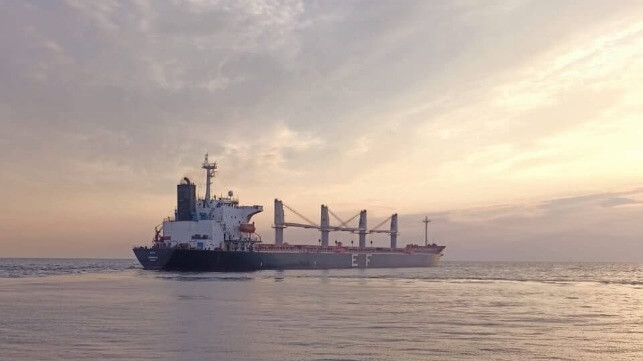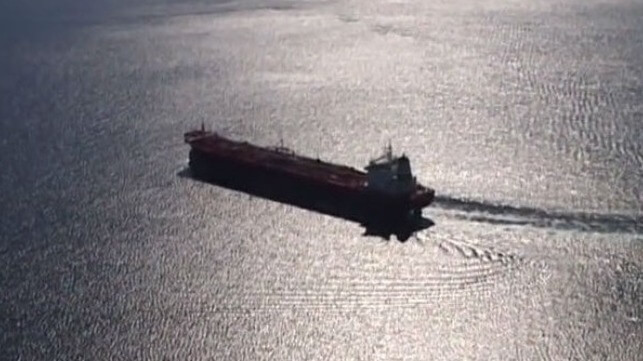SHIPPING IN WAR ZONES
Bulker Chartered by Cargill Lightly Damaged by Likely Black Sea Mine

Media reports from Ukraine are saying that a bulker departing the port of Pivdennyi (Yuzhne) reported an explosion that was likely caused by a floating mine. While the vessel is reported to be lightly damaged and proceeding under its own power, it came as efforts were underway to introduce a new war risk insurance program to encourage more ships to undertake grain exports from Ukraine and Russia also reported that it has commenced grain exports.
According to unnamed Ukrainian officials and security consultants who spoke with Reuters and Bloomberg, the vessel is believed to be the Georgia S, a 75,000 dwt bulker registered in Liberia. The reports are that the vessel, which is managed by Sea Gate Navigation of Greece, is operating under charter to Cargill. The vessel is reported to be loaded with a cargo of wheat.
The last AIS signal from the vessel on the evening of November 17 shows her off the Romanian coast, although some reports were that she was heading to Constanta, Romania for an inspection. She was following the standard practice of limiting her AIS signals while she was in Ukrainian waters and not declaring destinations on AIS. She was shown heading to the Bosporus, where she was due on November 18.
This latest incident came as one of Ukraine's deputy ministers, Yuriy Vaskov highlighted to the news agency Interfax-Ukraine the continuing volumes on Ukraine’s Black Sea shipping corridor. They reported that it has now surpassed 150 ships that have made the transit. A total of 3.2 million tons of grain has been exported since August and an additional 1.2 million tons of other material.
Ukraine reported that 30 more ships were currently loading in its Black Sea ports with 22 ships that would be carrying more than 700,000 tons of grain. The eight additional vessels were reported to be loading other cargo.
Insurance broker Marsh said on Wednesday that it was launching a new facility to provide affordable insurance to support the grain exports from Ukraine’s Black Sea ports. It was previously reported that the UK’s Prime Minister Rishi Sunak had helped to broker the new program. Marsh had provided a similar service starting in July 2022 to support the Black Sea Grain Initiative set up by the United Nations.
Marsh said the new effort was being underwritten by insurers based at Lloyd’s of London and it was developed in coordination with Ukrainian financial institutions and banks. They said it would be providing up to $50 million in hull and separate protection & indemnity war risk insurance. The Ukrainian institutions will be issuing standby letters of credit confirmed by DZ Bank.
The goal was to offset some of the concerns that emerged in the market after another bulker docked in Ukraine was stuck last week by a likely errant Russian missile. The UK Defense Ministry believed the Russian pilot was attempting to target a Ukrainian radar signal but that the missile instead locked on the vessel’s transmissions. Risk insurance costs reportedly tripled after the prior attack, but it is unclear how the markets would respond to today’s incident.
While Ukraine continues to move aggressively to maintain its grain exports, Russia’s Agricultural Minister Dmitry Patrushev announced that they have also begun exports. He wrote on Telegram that Russia was fulfilling the promise of Vladimir Putin and two vessels had departed each carrying 25,000 tons of free grain. He said these ships were heading to Somalia and Burkina Faso and that other ships would be following.
International Security Warning Issued for Ships in the Red Sea

An international coalition set up to maintain maritime security and freedom of navigation across the Middle East region released a warning on Thursday, November 16, for shipping operating in the Red Sea region. The warning comes after a series of provocations as well as threats from the Houthi rebels in Yemen to shipping in the region.
“We continue to be concerned with a heightened threat level in the Red Sea,” the International Maritime Security Construct writes in its message. “The approaches to the Bab al Mandeb continue to be an area of concern,” they write advising ships on procedures for transiting the Red Sea and Bab al Mandeb.
The strait between Yemen on the Arabian Peninsula, and the area known as the Horn of Africa where Djibouti and Eritrea are located, is a vital shipping lane. Oil tankers departing the Middle East as well as numerous containerships sailing the routes between Asia and Europe pass through the area. The strait is the link between the Indian Ocean, the Suez Canal, and the Mediterranean.
The IMSC does not point to any specific incidents in its advisory. However, it has been widely reported that the Houthis, the Iranian-backed militia that controls large sections of Yemen along the Red Sea issued a direct threat at the beginning of the week. Israeli shipping and vessels that they believed were linked to the U.S. and the Hamas war were viewed to be in the greatest danger.
Both the U.S. and UK have increased their naval presence in the region with the U.S. reporting several recent incidents. The guided-missile destroyer USS Carney, which was operating with the Gerald R. Ford Strike Group, was directed through the Suez Canal and into the Red Sea in mid-October. The vessel reported on October 19 intercepting at least three missiles fired from Yemen. While at the maximum range of the weapons, the U.S. Pentagon said they believed they were being fired toward Israel. The same vessel took down an unspecified number of drones that had been launched from Yemen, with some later news reports saying the assault lasted for at least four hours, although the U.S. said it did not believe the Carney was targeted.
Shortly after the Houthi rebel group threatened to attack Israeli shipping in the Red Sea this week, the USS Thomas Hudner reported that it too had shot down a suspicious drone. The Pentagon confirmed the incident on Wednesday, November 15, saying the destroyer “engaged and shot down the drone to ensure the safety of U.S. personnel.”
Based on the heightened threat level, IMSC and the Coalition Task Force Sentinel from Bahrain issued recommended procedures for all vessels transiting the area.
They are saying that vessels, when possible, should make the transit at night to reduce the likelihood of visual identification by “malign actors.” They are also recommending that vessels communicate to either the UKMTO or U.S. Naval Forces Central Command their movements ahead of time or if there is there is reason for elevated concern.
“Should your vessel be threatened, don’t stop and be a hard target through your maneuver,” they write in the advisory signed by the commander of IMSC.
No comments:
Post a Comment